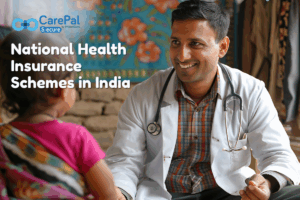Understanding different stages
of cancer

French philosopher Jean Jacques Rosseau summed up happiness as having a good bank account, good food and good digestion. The importance of good digestion can hardly be overstated. Natural healing systems like Ayurveda, Yunani, and Chinese medicine place great importance on digestive health, believing it influences not just physical well-being but also personality and behavior, echoing the familiar saying “You are what you eat.” Digestive issues signal an imbalance or deficiency in your body that requires attention.
Digestive Health is extremely important as gastrointestinal diseases can cause complications in the entire body. To being with bad digestive health leads to poor absorption of nutrients, leading to a weak immune system and low energy and vitality. Furthermore, digestive problems are linked to weight gain and hormonal imbalance, leading to diabetes related problems as well as mental health issues. In this article, we will explore how you can get health insurance coverage for digestive disorders.
Are digestive health disorders serious enough to be considered for insurance?
A common tendency is to dismiss digestive problems as relatively less serious as compared to other diseases. However, that is not the case. Gastrointestinal disease is really a collection of diseases which rangeCancer is one of the fastest growing critical illness in the world. It kills more people in a single year than COVID did in 2020. And yet we don’t see it getting the same kind of attention in policy circles and general public view. Part of the reason is that cancer is not fully understood by public at large. One of the least understood aspects of cancer is that it is an illness that is progressive in nature. This means that, except in extremely rare cases, cancer progresses over a period of years and decades in the human body. Often there are no outward symptoms as happens with viral or bacterial diseases. It develops silently and often by the time the symptoms appear, the cancer, which begins small in a specific body part, has spread and is on its way to becoming fatal.

The slow and unnoticed development is the real challenge of cancer. However, it is also what gives us the chances to deal with cancer while it is in early stages. The outcomes of dealing with different stages of cancer vary considerably. For example, if Breast Cancer is detected at stage 1, it has a survival rate of 100% while if it is detected at stage 4 the survival rate drops to as low as 25%. If early stage detection can make all the difference, then it is important for everyone to understand the different stages of cancer.
Why is cancer staging important?
Staging is a way of describing the size of a cancer and how far it has grown. When doctors first diagnose a cancer, they carry out tests to:
- The size of a cancerous tumor
- The spread of tumor into surrounding tissues
- Whether it has spread to other parts of the body
Cancer Staging is important because it helps your treatment team to determine the type of treatment you need. The treatment could be local surgery and radiotherapy if the cancer is in an early stage. This is much less expensive and painful than whole of body treatment the patient might need if the cancer has spread in other parts of the body. There are two methodologies to describe the different stages of cancer, the TNM system and the number system.
TNM staging system
The TNM (Tumor, Node, Metastasis) staging relies on three factors to classify cancer.
- Tumor indicates the size of the tumor and the extent to which it has spread into nearby tissue. This parameter is scored between 1 to 4 with 1 being small and 4 indicating a very large tumor size.
- Node indicates the extent to which cancer has spread in the lymph nodes, the tissues which filter the fluids in cells to keep the body healthy. This parameter is scored on a scale of 0 to 3 with 0 indicating absence of cancerous cells in the lymph nodes and 3 indicating extensive spread of cancer.
- Metastasis stands for the extent to which cancer has spread from original organ to different parts of the body. This parameter is either a 0 or 1 where 0 denotes no spreading and 1 denotes the spread of cancer to other parts of the body.
In this system, a cancer which is still small and has spread to lymph nodes but has still not spread to other parts of the body would be categorized as T1N1M0. TNM system is the most widely used cancer staging methodology. However, it is not very easy to explain to patients and their families. Hence, doctors have in parallel also evolved a number based staging systems to facilitate communication.
Numeric stages of Cancer and treatment types
Number based stages for classifying cancer and their broad meanings are:
- Stage I is used to denote that a cancer is as yet small and is still contained within the organ where it has started. At this stage, cancer is often highly treatable through surgery or localized therapy.
- Stage II usually means that the cancerous tumor has grown beyond stage 1 but it hasn’t spread into the surrounding tissues. However, for some types of cancers, it can also mean a stage where cancer has spread into the lymph nodes. At this stage, treatment consists surgery, radiation, chemotherapy.
- Stage III usually means the cancerous tumor has become large (5cm and more) and cancerous cells have started spreading into surrounding tissues and in the lymph nodes. At this stage, surgery, radiation and chemotherapy might need to be supplemented by targeted therapy.
- Stage IV This is the stage when the cancer has metastasized, i.e. spread to other parts of the body. This is the last stage of cancer. The treatment at this stage is focused on managing symptoms and improving the quality of life for patient.
When doctors detect some abnormal growth which might turn cancerous in future, they classify the same as Stage 0 or Carcinoma in Situ.
The survival rates of patients progressively vary significantly at different stages of cancer. In India, most of the cancer cases are diagnosed at stage 3 and 4, which is why the survival rates are often lower than the more developed countries in North America and Europe. from relatively harmless stomach troubles to serious conditions like livers diseases and colorectal cancer. Thus, health insurance coverage for digestive problems is very important.
Five Factors you should consider for selecting a health insurance plan:
Financial Strength of the Health Insurance company:
The solvency ratio which tells you about the reserves that Health Insurance company has to pay for the claims is an important factor. The other thing is to see their sales numbers. A good company will have a steady growth over years.
Underwriting strength of the Health Insurance company:
It is commonly believed that higher the claims paid by a health insurance company, the more customer friendly it is. That is not the case. A very high claims paid ration (claims paid /premium collected) is a sign of a company with a bad underwriting process and is therefore unlikely to survive in the long run.
Claims Process:
The purpose of Health Insurance is to get paid fairly and promptly. Hence, you should do ground work on claims settlement ratio, customer complaints and overall perception of the Health Insurance company for customer service.
Coverage Terms:
What is the hospital network, what are coverage conditions, what are exclusions, etc. in your health insurance policy should be understood in detail. Most times, customers just do a very simple surface level comparison with price as the focal point. That’s something we advise our customers to guard against.
Doctor Tele Consultation & high-quality diagnostics:
Digestive health issues require urgent doctor consultation. It can become difficult in the night, week offs and on holidays. Hence, it is very important that your Health Insurance plan provides you with high-quality teleconsultation. Another factor for digestive problems is that doctors will often ask for diagnostic tests (blood, urine, MRI etc.) to understand the issue better. Hence, your health insurance plan should take care of this aspect too.
Five ways to improve your digestive health?
Eat healthy and balanced diet:
The first step towards improving your digestive health is to have well-proportioned meal rich in nutrients, fiber and low on salt, sugar and processed foods. The easiest way to do this is to have home cooked food where possible, focus on protein as modern Indian diet is usually not very high on protein, reduce intake of wheat/rice and increase millets in food, and make sure that at least of half of your meal by weight is lightly cooked vegetables /salad/fruits.
Take care of your gut health:
Digestive problems are directly linked to your gut health. Encouraging growth of good gut bacteria is essential to avoiding gastrointestinal issues. Eating traditional Indian foods like dahi, idli, fermented rice is a great way to encourage good health. In non-Indian cuisine, sauerkraut, kimchi etc are great ways to incorporate fermented foods.
Quit Smoking and Avoid Alcohol:
Smoking harms the lining of intestines and increases the risk of ulcers. Hence, quitting smoking is the surest way to improve your digestive health. As for alcohol, while many claim benefits in moderation, there is no study which has proven the same. What we do know for sure is that alcohol is bad for the liver, hence avoiding alcohol is avoiding digestive problems.
Exercise regularly:
Exercise benefits our overall wellbeing and has a positive impact on all the body functions. Many scientists are of the view that the rise of disease in modern life is directly linked to lack of physical activity. Digestive Health gets a boost from exercise even at moderate levels, as exercise increases the blood flow in the system. What is not known as much is that exercise also promotes the growth of gut bacteria in your intestines, helping avoid bloating and constipation.
Avoid Stress:
A wit once remarked, “Stress is a bit like desserts. A lit bit of it now and then is all right, but having a lot of it regularly is going to mess you up!” Stress is bad for your body as it raises hypertension, increases risk of mental problems and also leads to digestive problems. People under stress tend to eat either a lot or very less. This is called stress eating and leads to digestive issues. Stress is linked very closely to ulcers as well.
Which is the best health insurance plan for digestive problems?
The CarePal Secure Max Plan is designed to cover various essential health services, providing complete peace of mind with inpatient hospitalisation, donor expenses, and AYUSH treatment coverage. The plan includes pre- and post-hospitalization care, with room rent coverage and accident protection from day one. Pre-existing conditions come with a reduced waiting period of only 2-3 years, allowing you to enjoy coverage sooner.
For health coverage, the plan offers a super top-up insurance of Rs. 25 lakhs with a Rs. 5 lakh deductible, covering up to four family members. Leading brands like Manipal Cigna, Star Health, and Care Insurance power it. Enjoy cashless treatments at partner hospitals and benefit from road ambulance coverage whenever needed.
Frequently Asked Questions
Good digestion ensures proper nutrient absorption, strengthens immunity, and boosts energy levels. It also prevents complications like weight gain, hormonal imbalances, and chronic diseases.
Consider the insurer’s financial stability, claims process, coverage terms, and inclusion of services like teleconsultation and diagnostic tests. These factors ensure smooth access to care and timely claim settlements.
Poor digestion can cause nutrient deficiencies, weakening the immune system and leading to fatigue. It’s also linked to weight gain, diabetes, and mental health issues.
Adopt a balanced diet rich in fiber and fermented foods, quit smoking, avoid alcohol, exercise regularly, and manage stress to support healthy digestion.
It offers comprehensive benefits, including hospitalization, diagnostic tests, and teleconsultation, with a reduced waiting period for pre-existing conditions and cashless treatments.
Hi, my name is Om, and I am a developer at Carepal Secure. With a strong passion for technology and innovation, I enjoy creating effective solutions and learning new skills to enhance my expertise. My journey in development has been both challenging and rewarding, allowing me to grow professionally while contributing meaningfully to the projects I work on.












